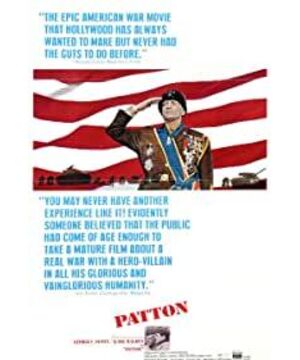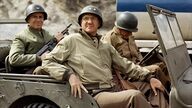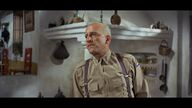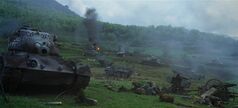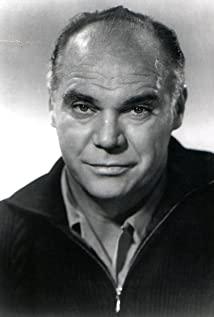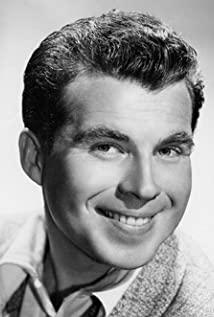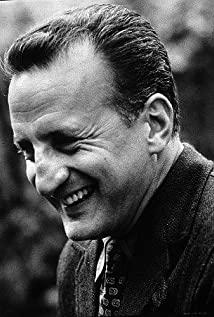What he represents is the tragedy of American heroism.
Both the beginning and the end of the film are shot with a large long-term view, and there is only one person in the lens, that is our protagonist Patton. At the beginning, the stars and stripes filled the screen, and then Patton was dressed in military uniform and decorated with illustrious medals. The camera kept projecting Barton, giving a close-up when he spoke harshly, and a medium and close-up when talking about honor. There was no appearance of the soldiers being coached. Obviously, the director wants to express that Patton is the protagonist, and the individualism is very strong, which will eventually increase the heroism of World War II. At the end, Patton's back is accompanied by the vast grassland, blue sky, windmill and cowardly dog William. Patton's voiceover tells the story of ancient Greek wars. The last sentence is: "All honor... will always disappear." The ox cart slipped on the street before suggesting that the real Patton died in a car accident, and the director arranged such an idyllic ending, probably out of reverence for the hero, hoping that if If possible, let a hero return to the field to disarm and spend his old age in peace.
In the film, there is only one dark night and one expansive snow scene in the outside scene. At other times, especially when Patton is fighting, there must be blue sky and white clouds. Strong light, saturated light, gives a kind of grandeur and glory of war. This is what Patton desires. An upright war.
"He's the Don Quixote of the sixteenth century," said the German.
Heroes are victorious allies, evil enemies are fascists. But the simple storyline of the hero defeating the enemy is nothing to watch, so the director also restored the political struggle within the allies, which is also the tragedy of Patton. How can a warrior be intrigued by politics? When Patton attacked Ballerman first, the director made a joke: the Germans and the British responded with "damn" when they heard the news. This is just the beginning. The latter one slapped a soldier and resigned Barton. Rommel couldn't believe it. The Normandy landing was used as a bait, and the attack on Berlin was hampered by the commander Al and his fellow boss Brad. Barton could only hold grudges in his heart. Finally, at a victory dinner with the Russians, he called them sons of a bitch. Nothing but Barton's tragedy.
Of course, in addition to the tragedy of the objective conditions of being born at the wrong time, Patton also has the tragedy of the character of the inner conditions. Germans commented that he was a man of the 16th century. He lived for the war, and without the war he would have to die; Patton visited the ancient ruins and could smell the smell of a thousand years ago, the smell of war; sigh of failure. Where can there be such a general who is passionate about war and victory during World War II? Mongrier's struggle for merit, Brad's acquiescence, politicians with political faces, who can have the realm of Patton? "By Jun, don't ask about the title of the marquis, and once you succeed, your bones will die." Although Patton is not good at being a prince, he is fanatical about war, for the honor of war, and for the endless war. In this way, it is the inner tragedy of Patton who is out of tune with the times.
The author believes that "General Patton" can be regarded as "the main theme film of the United States". In the opening speech of Patton, he said that he wanted to destroy the enemy and smash the enemy, but there was no scene where Patton shot and killed people, only those who killed donkeys. At the end, the Nazis were not killed, and the scientists were left behind. It can be seen that Patton did not aim at bloody killings, but was just a fanatical war of the 16th century knights, and also reflected the humanitarian spirit of the Americans. It is a masterpiece of biography.
View more about Patton reviews


